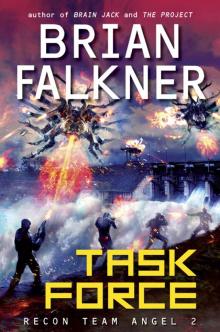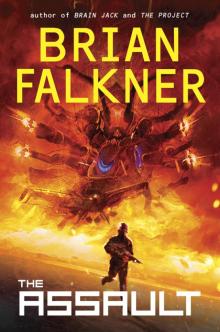- Home
- Brian Falkner
Brain Jack Page 10
Brain Jack Read online
Page 10
They crossed the road and headed down the ramp to the underground parking area and secure entrance to the CDD building.
“I’m just trying—” Sam began, but Vienna cut him off.
“Right now, you’re all that Dodge has to watch his back. If you crash and burn, he’s going to get taken down, and if that happens, and the bad guys get past the barricades, then we’re all in a deep pile of crap. You’d better stay lucky.”
Vienna walked up to the security door and swiped her keycard through the lock.
The outer door opened, and they entered the holding area. Vienna waited for the first door to shut before swiping her card at the inner security door.
The doors were linked. The inner one would not open while the outer door was still open, creating a kind of air lock to prevent unauthorized access to the building.
The inner door slid silently open, and Vienna headed toward the elevators. Kiwi stopped at a coffee machine and pressed buttons for a hot chocolate.
“So that’s why she doesn’t like me,” Sam said, stopping with him.
The machine whirred and ground its teeth. A paper cup with a pullout handle dropped down and began to fill.
Kiwi shook his head. “That’s not it. Not really. When you got past the defenses at Telecomerica, we were watching you the whole time. You were never supposed to get as far as you did. You beat us, big-time.”
“So?” Sam asked.
“Who d’you think was on your case?”
17 | FARGAS
The hospital corridor seemed to stretch out forever. Sam hurried along it, a slightly crumpled box of Hershey’s Miniatures clutched tightly in his hand.
The corridor was almost deserted except for an old man in pajamas who was inching his way toward Sam using a chrome walking frame. Sam passed him without acknowledgment.
The room was nearly at the end of the corridor. The door was open, but an apricot-colored curtain covered the entrance. Sam stopped and checked the number on the door before entering. He pushed back the curtain slowly and peered through to double-check that he was in the right place.
The room was large enough for two people, with a central curtain to separate the two beds, although only one was occupied. The walls were white and shiny, except for some stainless-steel panels. Various bits of high-tech medical machinery jutted out from the walls. The room smelled strongly of soap and antiseptic.
Fargas lay on the second bed, closer to the window, with a plastic tube embedded in his arm. The other end of the tube ran up to a plastic bag filled with a clear fluid. He looked gaunt in the sharp light from the window. His head was shaved, although not recently, his long hair replaced by a fuzzy mat of regrowth. He had dark rings around his eyes and bruises in a circular pattern around his head.
“Where’d they drag you up from?” Fargas asked, grinning as Sam entered.
“Mom e-mailed me,” Sam said, trying not to show on his face the shock he was feeling. “I just flew in.”
He neglected to mention that it had been on a government-owned Learjet.
He held out the chocolates, and Fargas took them with a hand that twitched constantly.
“Thanks,” he said. “They gave you a get-out-of-jail pass, huh?”
“Something like that.” Sam smiled briefly.
“It’s good to see you, dude. What you been doing?”
“What have you been doing, man? What the crap is all this?”
“It’s nothing, man. Just being stupid. You know.” Fargas avoided his eyes. “Have a seat. How’s the job?”
Sam sat on a metal-framed chair with blue vinyl padding that was against the wall by the window. Sunlight hit the back of his head like a blast furnace.
“It’s …” Sam paused, then asked a little too quickly, “Job?”
“You can fool your mother with that bull about prison, but you can’t fool your best friend. So, what are you, some kind of government spy now?”
“Why do you say that?” Sam asked.
“You’re not the only one who knows how to use a computer,” Fargas said. “When you disappeared, I started prowling around the Internet. To see if I could track you down. Next thing, two heavies in black suits turn up on my doorstep telling me to cease and desist.”
“What did you do?” Sam asked with sudden concern.
“I ceased,” Fargas said. “Then I desisted. But I’m not buying into any story about prison.”
“It’s complicated,” Sam said, and this time it was he who avoided Fargas’s eyes.
“Can’t talk about it, huh? Where you living now?”
“Out west,” Sam said, and when Fargas was silent, he added, “San Jose.”
“Nice.”
“How’s school?” Sam asked.
“I gave that away. Wasn’t getting anywhere. Tell me about San Jose.”
“I’m really not supposed to say anything.”
“Not even to me?”
“No one,” Sam said.
There was an uncomfortable silence.
“I like your new haircut,” Sam said.
Fargas rubbed his head. “They reckon you get a better connection. I never noticed any difference, though.”
Another silence. The sun on the back of Sam’s head was making him feel a bit woozy, as if his brain was slowly broiling inside his skull. He moved the chair into the shade of a curtain.
“Why don’t you come over to San Jose? Hang out with me,” he said.
“You got a job, man. And what am I going to do in Jose?”
“Lot of hot chicks there.”
“Dude, I can’t get a girl to look at me here. Why do you think some pumped-up, bleach-blond, West Coast chick is gonna pucker up for me?”
“Fargas, there’s gotta be better—”
“Better?” Fargas cut him off, sitting up and leaning forward with sudden fire in his eyes. “You better than me, dude?”
“No, man.” Sam jumped to his feet, holding his hands up in front of him as if fending off an attack.
“It’s okay. I’m just playing with you.” Fargas flashed a grin and lay back down. “Of course you’re better than me. You got a job. Secret agent man. Got a fancy apartment, I bet. You got a fancy chick too?”
Sam sat back down in his chair. “Come over. Check it out for yourself,” he said.
“So I can be a dweeb loser on a different coast? Forget about it. Inside the game, I’m a king.”
Sam said nothing for a moment and just looked at Fargas. He said, “That’s not real, man.”
“Works for me,” Fargas said.
“Really?” Sam asked, and it was Fargas’s turn to be silent for a moment, staring down at the bedsheets.
“It’s exciting,” he said eventually. “I started out as a peasant and now I’m a king.”
Sam said nothing.
“I guess …,” Fargas began. “I guess it started with just an hour or so in the evening. You know, finish my homework and play a bit before bed. And then I started playing before my homework. I’d promise myself that I’d play for an hour, then do my work, but I never did. Sometimes I’d play until I fell asleep, at like three or four in the morning. So I set a time for myself. Two hours a day, max. Seven p.m. till nine p.m. But I found that between times, all I was thinking about was the game, so I might as well log on.”
Sam shook his head.
“It’s really exciting,” Fargas said again. “You’re running on adrenaline the whole time. You see this beautiful woman enter the room, and part of your brain knows that she could just as easily be a ten-year-old boy from New Jersey or some fifty-year-old guy from Australia, but you don’t really think about that. You’re wondering if she’s a princess, or a spy, or an assassin. When you log out, the real world seems flat and gray. No gorgeous women are going to walk in your door and try to kill you. There are no armies to lead on a counterattack against the neighboring kingdom. Your dad asks you to take out the trash, and you look at your stats homework that you haven’t done yet, and you just wan
t to climb back inside.”
“You hadn’t eaten in four days,” Sam said. “You were passed out on the floor.”
Fargas said, “I’m good at this. Really good. My kingdom is strong, and my subjects respect me. In there, all your real-world problems, they just disappear. The worst thing that could happen to you is that you might die and have to start over.”
“I’ll move back. Forget the job. We’ll hang out like we used to,” Sam said.
Fargas looked him in the eye for a while, then broke the gaze. He laughed. “No, man. I’m all right. I was just blowing off steam. I kicked it. I’m not going back in again. The king is dead. Long live the next king.”
“True?”
“Yeah, man. Those games are dangerous. I can’t believe they’re still legal.”
“What are you going to do?” Sam asked.
“Got a good shot at a job with Truck-Rite. My uncle organized it. Just a store man, but someday I could end up a driver.”
“Cool. Big rigs?”
“Ten-four, good buddy,” Fargas said. “Might get a coast-to-coast and come see you after all.”
Sam thought about that for a moment. He had the feeling that it would never happen.
“No, come to San Jose,” he said in a no-arguments tone. “I know some people there. I can get you a good job.”
He wasn’t sure if that was true, but the amount he was earning, he could pay Fargas’s wages himself if he had to.
“No—”
“It’s not a suggestion,” Sam said. “You can stay where I’m staying till you get a place of your own. It’ll be cool.”
“They’re going to keep me here for a week,” Fargas said, glancing up at the IV bottle.
“As soon as you’re out, let me know,” Sam said. “I’ll organize the plane ticket.”
Fargas’s eyes wandered around the ward for a moment, then finally settled back on Sam.
“Okay,” he said, and there was a lift in his voice. “Okay, yeah, let’s do that. It’ll be cool.”
“It’ll be cool,” Sam echoed with a smile. “I’ll see you in a week or so.”
18 | SHARKS
The Sharks’ wing scraped tightly around the back of the net, cut inside the defender, and flicked a reverse shot past the goalie’s outstretched glove into the net.
The blind man in front of Sam roared with excitement and leaped to his feet.
Sam checked the scoreboard. That put the San Jose Sharks ahead of the Anaheim Ducks with just two minutes to go. It was his first hockey game, and it was pretty exciting stuff.
One of the Ducks’ players had taken offense to something, though, and had jammed the Sharks’ center up against the fence, pummeling him with heavy blows.
The Shark took it for a moment, then responded with a deep uppercut that caught the Duck under his chin, cracking his head backward and knocking him flat on his back on the ice.
The blind man thrust a fist in the air, almost as excited by the fisticuffs as by the goal, but all his jumping around must have upset his neuro-headset, as he sat down again quickly and made some adjustments to it.
The man’s cameras were built into heavy-framed glasses, feeding the image to a portable receiver on his belt, then directly into his neuro-headset.
With neuro, blind people could see; deaf people could hear. Some said it was the greatest step forward since the invention of language itself. They were even producing neuro-caps now that let you see in the dark, access street maps, or just listen to music.
Sam had heard that the portable neuro-sets could also pick up the video feed from the TV cameras, so the man would have instant access to all the camera angles, slow-mo replays, and high shots that the TV audience at home saw.
“Why don’t we use neuro at CDD?” Sam asked.
Dodge half turned his head, keeping his eyes on the ice. “You figure it out,” he said.
“Been trying,” Sam said. “Doesn’t make any sense to me. I can work much faster on my laptop back in the hotel with my neuro-set than I can in the office using a keyboard and mouse.”
The Ducks had two quick shots at the Sharks’ goal, but their quick-handed goalie deflected them both, keeping the Sharks in front.
“Okay, see that man three rows in front of us?” Dodge asked, pointing discreetly.
The man was tall and balding, sitting next to two young boys who were probably his sons. On the other side of the boys, a woman, perhaps the man’s wife, was engrossed in the game. The man, however, had his cell phone concealed in his lap.
“Yeah.”
“Texting away on his cell phone, in the middle of an exciting ice hockey game. What could be so important to keep him from watching the game?”
“Beats me,” Sam said.
“Let’s find out.”
Dodge produced his cell phone and slid up the front panel to reveal the miniature keyboard underneath. He tapped a few keys, then aimed the stubby aerial of the phone right at the man.
“Blue rifle, built in,” he said. “I’m bluesnarfing his cell.”
He showed the man’s cell phone number to Sam.
“From his phone company, I’ll get his home address and find out his Internet service provider.”
Sam watched, intrigued, as Dodge worked. A moment later, he held up the phone triumphantly. “Got him.”
“Okay, he’s got three computers on his home LAN. A laptop, a desktop, and one other that I think is his sons’. Let me check his e-mails and chat history,” Dodge said.
Sam looked on with interest.
“Interesting. He’s recently deleted a whole bunch of chat history. Let’s recover that and see what it says.”
Dodge looked up after a moment. “I suspected as much. He’s having an affair. Probably chatting to his girlfriend right now. Right in front of his wife, the dirty geezer.”
“Let’s have a look, then,” Sam said.
“Too right.”
Dodge pressed a few more keys, then held his phone up for Sam to see. “Here are his last few texts.”
Sam’s eyes widened. Dodge was right. The man was texting his girlfriend, in intimate, flowery language, with his wife sitting three seats away.
“Watch this,” Dodge said, and worked away for a moment.
A sudden roar of laughter came from the crowd, and Sam followed the movement of heads toward the huge electronic scoreboard.
In the space for messages and announcements, the man’s texts, sent and received, were now slowly scrolling up the screen as he typed them.
U R da luv of my lyf
I cnt wait 2 CU & run my fngrs thru yr hair
I wnt 2 kss U rite now
On it went, getting steamier by the line.
The man was still texting, unaware that every word was being displayed in huge letters to everyone in the stadium, including his wife.
The woman looked at the scoreboard, then at her husband, noticing the cell phone. She reached over and snatched it off him in a deft movement, comparing the screen of the phone to the scoreboard.
The man started to whimper something, but his wife wasn’t having a bit of it. She grabbed the boys’ hands and stormed off, the man, red-faced, trailing in her wake.
The crowd erupted into hoots and cheers.
“And that is why we don’t use neuro,” Dodge said with a smug smile.
Sam looked at the retreating family, then turned back to Dodge and raised an eyebrow.
“Took me thirty seconds to find out everything worth knowing about that guy,” Dodge said. “We can hack into anything. You plug your brain into a computer, who’s to say that someone can’t hack into that too?”
“You’re joking.”
“Serious as a heart attack. The headsets have got a special neuro-firewall, specifically to prevent it. They even have a term for it: brain intrusion. But since when has a firewall bothered people like you and me? There’s no way that the Oversight Committee is going to—”
Dodge’s cell phone emitted an urgent bleeping
noise. A half second later, Sam’s started woofing.
“Bleedin’ hell,” Dodge said. “It’s begun.”
19 | THE RAID
“Here they come,” Dodge said. “And they’re coming in heavy.”
“Listen up,” Jaggard said from the center of the room. “This is no stealthy, crawling, under-the-wire incursion. It’s a full-on cyberattack, and the targets are nuclear reactor sites.”
“We’re covering Peach Bottom,” Dodge said. “Since we know it best. We’re going in battle-group formation; Vienna and Kiwi are covering our six, with Zombie and Gummi in reserve. Stay on my tail and keep those bugs off my arse.”
Sam glued his eyes to his screens and wished for his neuro-headset, despite what Dodge had said. The keyboard and mouse were just too slow and cumbersome.
“What are they after?” Vienna’s voice sounded in his ear. “They can’t bridge the air gap; we already checked that.”
“Maybe they know something we don’t,” Socks’ raspy voice said.
Dodge said, “They’re after something, or they wouldn’t be coming in this hot and hard. Let’s kick them in the bollocks first of all, then try and figure out their game plan.”
“Where are they coming from?” Vienna asked.
“Working on it,” Kiwi replied.
“I’m going to try and take back the main router,” Dodge said. “As soon as I hit them, their bugs are going to be all over me. Sam, I’m depending on you.”
“I’m there,” Sam said in a quiet voice.
“Vienna, you lead with a diversionary attack on the Internet gateway,” Dodge said. “Make them think we’re coming in through the roof. Stay sharp.”
Sam kept one eye on his left monitor, following what Dodge was doing, and kept the other on his scanners on the right. They had drilled and drilled exactly this scenario, running simulations and game plays against their simulator computer and against each other.
But this was no game. This was real.
Dodge was going in to root out the malicious code on the main router, but in doing so, he was exposing himself to attack. Sam’s job was to cut that attack off at the knees.
“There you are, you slimy prat,” Dodge said. “Big mother of a candiru fish, hiding in the swap file. I’m going to hit it with a depth charge. Vienna, Zombie, get on the nodes around me and watch for wrigglers.”

 The Real Thing
The Real Thing Task Force
Task Force The Flea Thing
The Flea Thing The Project
The Project Clash of Empires
Clash of Empires The Assault
The Assault Brain Jack
Brain Jack The Tomorrow Code
The Tomorrow Code Vengeance
Vengeance The Super Freak
The Super Freak Northwood
Northwood Cave Dogs (Pachacuta Book 1)
Cave Dogs (Pachacuta Book 1) Maddy West and the Tongue Taker
Maddy West and the Tongue Taker